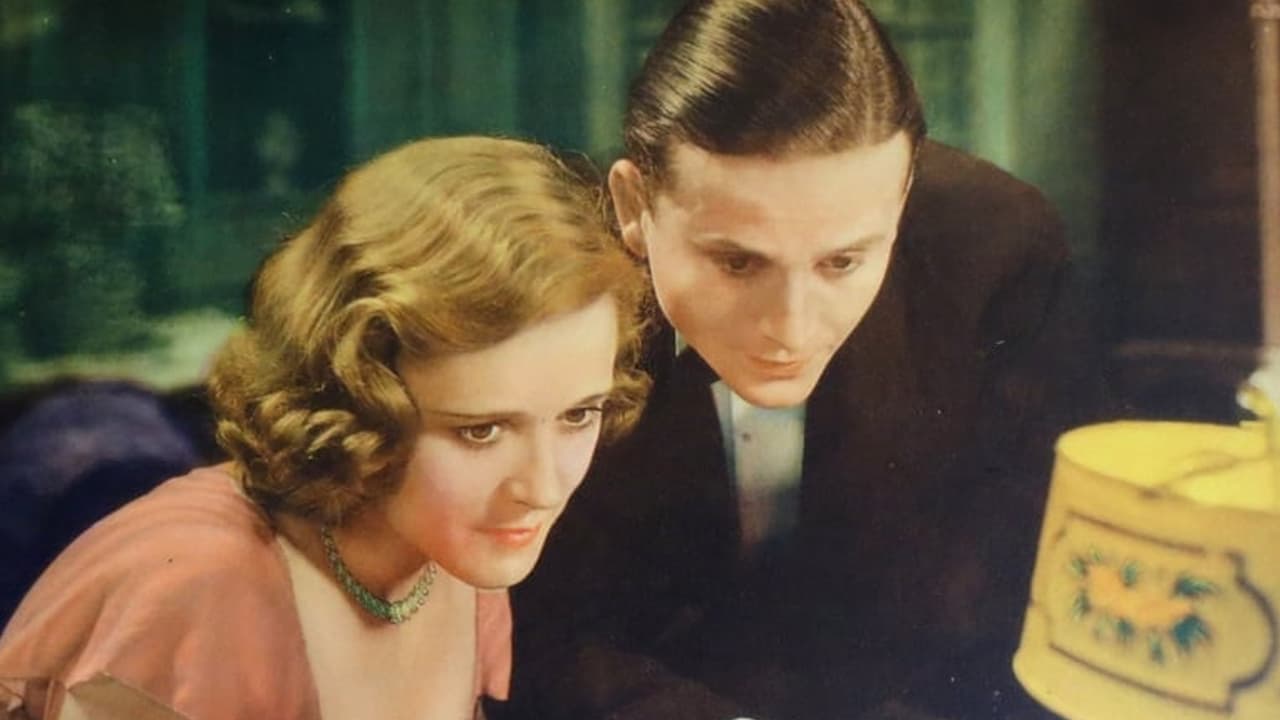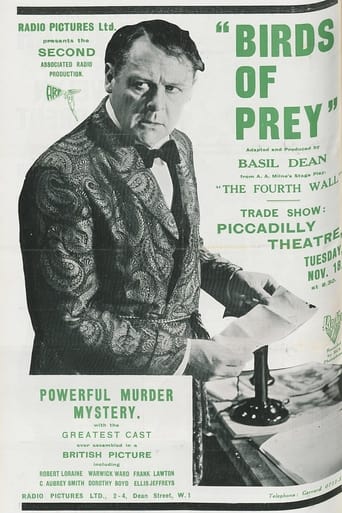Lucy-Lastic
I thought "Escape!" was bad enough, but this takes first prize for clipped upper class accents and one can only wonder at what the steaming masses made of these people when they saw them at the flicks on a Saturday night out. Apart from that the acting was also very hammy and I cannot agree with Film_Nitrate:- "though the young couple played by Frank Lawton and Dorothy Boyd are far more convincing than the rest of the cast" as they seemed to me to be the worst and the only people to come out of it all with some credibility were C. Aubrey Smith and Nigel Bruce.Nevertheless, it was fascinating to watch as a curio of its time - all I have to do now is run through it again quickly to spot a 20 year old Jack Hawkins in his first film (!?) as he was not mentioned in the film credits – only on IMDb it seems, so well done them!...................................(Oh yes, there he is – and almost blink an you'll miss him!!)
Film_Nitrate
For his second feature at the newly established Associated Radio Pictures, filmed at Beaconsfield whilst the famous Ealing Studios were still under construction, Basil Dean turned to a crime play from 1928 - The Fourth Wall. The play itself was unremarkable, but for the fact that it was written by A.A. Milne, who would become internationally known for his Winnie-the-Pooh stories. Dean himself adapted the script for the big screen, and altered the name to Birds of Prey (it was retitled again for its US release the following year to the less ambiguous The Perfect Alibi).At ninety minutes, the film has a slightly inflated running time considering most of the Ealing films released in the early 30s generally lasted between 60-70 minutes. This works against the film, and the first thirty minutes are a confusing mess. Things quickly slot into place when the murder itself is carried out, and we're treated to a Colombo-style killing where we witness the murderers and understand their motives. The suspense is then seeing if their "perfect alibi" is good enough to outwit the police and family of the murdered man.While at a dinner at a large country house, the retired head of the family, Arthur Hilton (C. Aubrey Smith) tells his guests and family about a time he was working as a police commissioner in Africa, and was working to catch a gang of three men who'd been responsible for a number of local murders. He found himself caught by them first, but they didn't kill him as he didn't carry a gun – therefore they didn't believe he was a policeman and let him go. Hilton later caught the men and was responsible for the hanging of one of them – though due to a discrepancy with evidence the other two escaped with 20-year terms in prison instead of the noose. It then transpires that Laverick (Warwick Ward) – a quiet man and keen birdwatcher, and Carter (Robert Loraine) – a loud, confident man – are the two men that Hilton locked up all those years ago (under different identities) and have been plotting their revenge ever since. The murder is perfectly arranged, making it look like suicide with even the local police believing this to be the case. It's only when Arthur's plucky nephew Jimmy (Frank Lawton) and his inquisitive girlfriend Mollie (Dorothy Boyd) begin their own investigation that they realise all isn't as it seems. Bonus points for spotting Jack Hawkins in his cinema debut.Indeed, if the script was taken from an unremarkable play, the film itself is similarly unremarkable. The pacing is clunky and the film feels too long. At times the upper-class accents of the women in particular are almost indecipherable (and that's to a native English speaker). The acting varies between wooden and unintentionally hilarious (though the young couple played by Frank Lawton and Dorothy Boyd are far more convincing than the rest of the cast). It seems a little unsporting to criticise Basil Dean excessively for the poor direction, as this was one of his first films, and virtually every director was forced to learn their craft again with the dawn of sound films, but "functional" is probably the most polite way to explain his contribution. There's a "Great Train Robbery" (1903) influence in the first shot as we witness a revolver firing at close range, but overall there is far too much talking - this may have been required in Dean's beloved theatres but in the film there is simply not enough use of the visual aspects of cinema.However, there remains an undeniable charm to the whole thing. As with Dean's previous film, 'Escape!' (1930), there's a lot of location shooting which shows off the beautiful English countryside. And even though – after the first half hour – the film is terribly predicable, it's still entertaining enough, despite the aforementioned pacing issues.
malcolmgsw
This was the second production from Associated Talking Pictures in their studios in Ealing.It was to become world famous in later years as "Ealing Studios" under the aegis of Michael Balcon.The initial production chief was Basil Dean.He was basically a stage director and as such he was responsible for many misjudgements in the early years ,of which this was an example.This lack of judgement and his unpopularity as a result of his interference in direction of films was ultimately to see him fired from his job a few years later.This film is more of a battle of wits rather than a murder mystery.Nothing happens for the first half hour.then the sole murder is committed.we see who commits the murder so no drama or suspense there.It is seeing how the leads manage to deduce the murderer and track him or her down that is the focus of the last part of the film.This takes a rather long and dull 90minutes.Compare it with say the sound version of "Blackmail" and whilst technically it is far superior ,as a story and film it is vastly inferior..It is from a play and unfortunately it shows.It was a fault of some early talkies that they did nothing but talk and this is fully apparent in this film.Although Dean did bring to Ealing both Gracie Fields and George Formby he also brought further films such as this to ATP and this continual misjudgement led to his departure.The only interest in this film is seeing C.Aubrey Smith,,Nigel Bruce and Frank Lawton before they went on to their respective successes in Hollywood.


